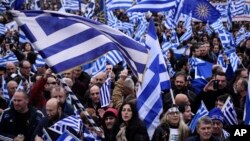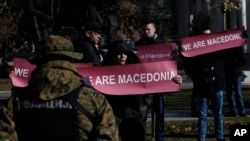Political leaders in Greece and Macedonia met Saturday to discuss ways to resolve a longstanding dispute over the name of Greece’s northern neighbor.
The meetings come days before United Nations envoy Matthew Nimetz will visit the countries to seek a compromise. Nimetz is expected in Greece on Monday and Tuesday before going to Macedonia the following two days.
Greece has disputed Macedonia’s right to call itself by a name shared with its own northern province of Macedonia ever since the Republic of Macedonia became independent in 1991. It has blocked Macedonia’s accession to NATO.
Greece contends that the use of the name, along with certain clauses in Macedonia’s constitution, imply territorial designs on Greece, as well as the perceived appropriation of Greek symbols and names, such that of Alexander the Great, the most famous ruler of the Ancient Greek Kingdom of Macedonia.
Although recognized as the Republic of Macedonia by the majority of countries, Macedonia sits in the U.N. as The Former Yugoslav Republic of Macedonia in deference to Greek objections.
Politicians meet
Greek Prime Minister Alexis Tsipras met Saturday with the leaders of all opposition parliamentary parties except for far-right Golden Dawn. Although none gave him carte blanche for negotiations, he focused his criticism on opposition leader Kyriakos Mitsotakis.
Tsipras described Mitsotakis as vacillating and too influenced by extremists within his party. The Greek premier said he is prepared to accept a “composite name ... with a geographical or historical reference” that would include the name Macedonia. This could mean a name such as Upper, or New, Macedonia.
“We must not listen to nationalist outbursts or fanatical shouts,” Tsipras said in a televised speech after the meetings were over. He nonetheless acknowledged that “there is still a long way” before an agreement is achieved.
Besides the opposition, the leftist Tsipras has to contend with his own defense minister and leader of the right-wing, populist Independent Greeks, who has called for a referendum on the name issue and suggested the neighboring country call itself “Vardarska.”
A protest against allowing the name “Macedonia” to be used by Greece’s neighbor is scheduled for Feb. 4 in Athens. It follows a similar one in Thessaloniki, capital of Greece’s Macedonia province, which, according to police, was attended by 90,000 people.
Talks, protests in Macedonia
In Macedonia, a “coordination meeting” under President Gjorge Ivanov went late into the night Saturday and no statements have been issued. It was attended by Prime Minister Zoran Zaev, Foreign Minister Nikola Dimitrov, and opposition leaders Hristijan Mickovski, the new leader of the conservative VMRO-DPMNE party, and Ali Ahmeti, head of the Albanian-minority Democratic Union for Integration.
There was a protest outside the meeting. The protesters object to Zaev’s proposal to rename Macedonia’s main highway and airport, both named for Alexander the Great, and demand termination of negotiations on the name issue.





